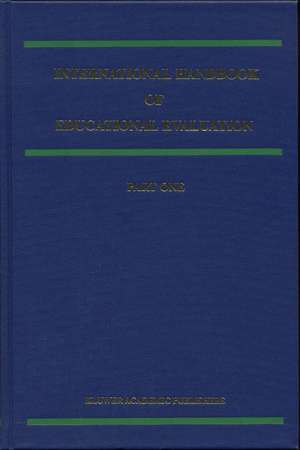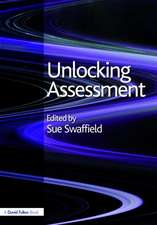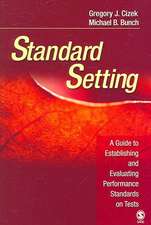International Handbook of Educational Evaluation: Part One: Perspectives / Part Two: Practice: Springer International Handbooks of Education, cartea 9
Editat de T. Kellaghan, D.L. Stufflebeamen Limba Engleză Hardback – 31 dec 2002
| Toate formatele și edițiile | Preț | Express |
|---|---|---|
| Paperback (1) | 5060.23 lei 6-8 săpt. | |
| SPRINGER NETHERLANDS – 3 dec 2014 | 5060.23 lei 6-8 săpt. | |
| Hardback (1) | 4420.62 lei 39-44 zile | |
| SPRINGER NETHERLANDS – 31 dec 2002 | 4420.62 lei 39-44 zile |
Din seria Springer International Handbooks of Education
- 18%
 Preț: 2566.01 lei
Preț: 2566.01 lei - 20%
 Preț: 2524.84 lei
Preț: 2524.84 lei - 18%
 Preț: 2495.78 lei
Preț: 2495.78 lei - 18%
 Preț: 2787.65 lei
Preț: 2787.65 lei - 18%
 Preț: 2509.03 lei
Preț: 2509.03 lei - 18%
 Preț: 2528.13 lei
Preț: 2528.13 lei - 24%
 Preț: 3412.30 lei
Preț: 3412.30 lei - 18%
 Preț: 2557.33 lei
Preț: 2557.33 lei - 18%
 Preț: 4736.83 lei
Preț: 4736.83 lei - 18%
 Preț: 2500.50 lei
Preț: 2500.50 lei - 20%
 Preț: 3447.61 lei
Preț: 3447.61 lei - 18%
 Preț: 2562.04 lei
Preț: 2562.04 lei - 18%
 Preț: 1917.28 lei
Preț: 1917.28 lei - 18%
 Preț: 3868.23 lei
Preț: 3868.23 lei - 18%
 Preț: 3082.96 lei
Preț: 3082.96 lei - 18%
 Preț: 3078.36 lei
Preț: 3078.36 lei - 18%
 Preț: 5421.52 lei
Preț: 5421.52 lei - 18%
 Preț: 4707.16 lei
Preț: 4707.16 lei - 18%
 Preț: 5517.65 lei
Preț: 5517.65 lei - 18%
 Preț: 3071.11 lei
Preț: 3071.11 lei - 18%
 Preț: 3089.10 lei
Preț: 3089.10 lei - 24%
 Preț: 2423.31 lei
Preț: 2423.31 lei - 24%
 Preț: 3706.61 lei
Preț: 3706.61 lei - 24%
 Preț: 2659.51 lei
Preț: 2659.51 lei - 24%
 Preț: 2731.09 lei
Preț: 2731.09 lei - 18%
 Preț: 4392.57 lei
Preț: 4392.57 lei - 24%
 Preț: 1695.02 lei
Preț: 1695.02 lei - 24%
 Preț: 2733.80 lei
Preț: 2733.80 lei - 24%
 Preț: 2638.90 lei
Preț: 2638.90 lei - 24%
 Preț: 1629.92 lei
Preț: 1629.92 lei - 24%
 Preț: 1863.15 lei
Preț: 1863.15 lei - 24%
 Preț: 3410.54 lei
Preț: 3410.54 lei - 24%
 Preț: 2649.85 lei
Preț: 2649.85 lei - 24%
 Preț: 2581.76 lei
Preț: 2581.76 lei - 24%
 Preț: 3592.43 lei
Preț: 3592.43 lei - 24%
 Preț: 2697.99 lei
Preț: 2697.99 lei - 24%
 Preț: 2642.90 lei
Preț: 2642.90 lei - 24%
 Preț: 2712.42 lei
Preț: 2712.42 lei - 24%
 Preț: 4134.92 lei
Preț: 4134.92 lei - 24%
 Preț: 3656.30 lei
Preț: 3656.30 lei
Preț: 4420.62 lei
Preț vechi: 5816.60 lei
-24% Nou
Puncte Express: 6631
Preț estimativ în valută:
845.88€ • 881.44$ • 700.39£
845.88€ • 881.44$ • 700.39£
Carte tipărită la comandă
Livrare economică 31 martie-05 aprilie
Preluare comenzi: 021 569.72.76
Specificații
ISBN-13: 9781402008498
ISBN-10: 140200849X
Pagini: 1088
Ilustrații: XVIII, 1060 p. In 2 volumes, not available separately.
Dimensiuni: 155 x 235 x 63 mm
Greutate: 2.25 kg
Ediția:2003
Editura: SPRINGER NETHERLANDS
Colecția Springer
Seria Springer International Handbooks of Education
Locul publicării:Dordrecht, Netherlands
ISBN-10: 140200849X
Pagini: 1088
Ilustrații: XVIII, 1060 p. In 2 volumes, not available separately.
Dimensiuni: 155 x 235 x 63 mm
Greutate: 2.25 kg
Ediția:2003
Editura: SPRINGER NETHERLANDS
Colecția Springer
Seria Springer International Handbooks of Education
Locul publicării:Dordrecht, Netherlands
Public țintă
ResearchCuprins
One: Perspectives Section 1: Evaluation Theory.- 1 Evaluation Theory and Metatheory.- 2 The CIPP Model for Evaluation.- 3 Responsive Evaluation.- 4 Constructivist Knowing, Participatory Ethics and &Responsive Evaluation: A Model for the 21st Century.- 5 Deliberative Democratic Evaluation.- Section 2: Evaluation Methodology.- 6 Randomized Field Trials in Education.- 7 Cost-Effectiveness Analysis as an Evaluation Tool.- 8 Educational Connoisseurship and Educational Criticism: &An Arts-Based Approach to Educational Evaluation.- 9 In Living Color: Qualitative Methods in Educational Evaluation.- Section 3: Evaluation Utilization.- 10 Evaluation Use Revisited.- 11 Utilization-Focused Evaluation.- 12 Utilization Effects of Participatory Evaluation.- Section 4: The Evaluation Profession.- 13 Professional Standards and Principles for Evaluations.- 14 Ethical Considerations in Evaluation.- 15 How can we call Evaluation a Profession if there are &no Qualifications for Practice?.- 16 The Evaluation Profession and the Government.- 17 The Evaluation Profession as a Sustainable Learning Community.- 18 The Future of the Evaluation Profession.- Section 5: The Social and Cultural Contexts of Educational Evaluation.- 19 Social and Cultural Contexts of Educational Evaluation: &A Global Perspective.- 20 The Context of Educational Program Evaluation in the United States.- 21 Program Evaluation in Europe: Between Democratic and &New Public Management Evaluation.- 22 The Social Context of Educational Evaluation in Latin America.- 23 Educational Evaluation in Africa.- Two: Practice Section 6: New and Old in Student Evaluation.- 24 Psychometric Principles in Student Assessment.- 25 Classroom Student Evaluation.- 26 Alternative Assessment.- 27 External (Public) Examinations.- Section 7: Personnel Evaluation.- 28 Teacher Evaluation Practices in the Accountability Era.- 29 Principal Evaluation in the United States.- 30 Evaluating Educational Specialists.- Section 8: Program/Project Evaluation.-31 Evaluating Educational Programs and Projects in the Third World.- 32 Evaluating Educational Programs and Projects in the USA.- 33 Evaluating Educational Programs and Projects in Canada.- 34 Evaluating Educational Programs and Projects in Australia.- Section 9: Old and New Challenges for Evaluation in Schools.- 35 Institutionalizing Evaluation in Schools.- 36 A Model for School Evaluation.- 37 The Development and Use of School Profiles.- 38 Evaluating the Institutionalization of Technology in Schools and Classrooms.- Section 10: Local, National, and International Levels of System Evaluation.- 39 National Assessment in the United States: The Evolution of a &Nation’s Report Card.- 40 Assessment of the National Curriculum in England.- 41 State and School District Evaluation in the United States.- 42 International Studies of Educational Achievement.- 43 Cross-National Curriculum Evaluation.- List of Authors.- Index of Authors.- Index of Subjects.
Recenzii
"...this handbook should be in the library of each higher education institute, faculty, research group and/or R&D institute dealing with or working in the domain of evaluation and assessment... A further inspection of the book shows that an interesting strength of the book is how the section editors perceived their roles. In most cases they not only introduce and position their section authors, but they also provide a view of how they see their parts of the field."
(Tjeerd Plomp in Perspectives in Education, 21:1 (April 2003)
(Tjeerd Plomp in Perspectives in Education, 21:1 (April 2003)
Caracteristici
Includes supplementary material: sn.pub/extras













